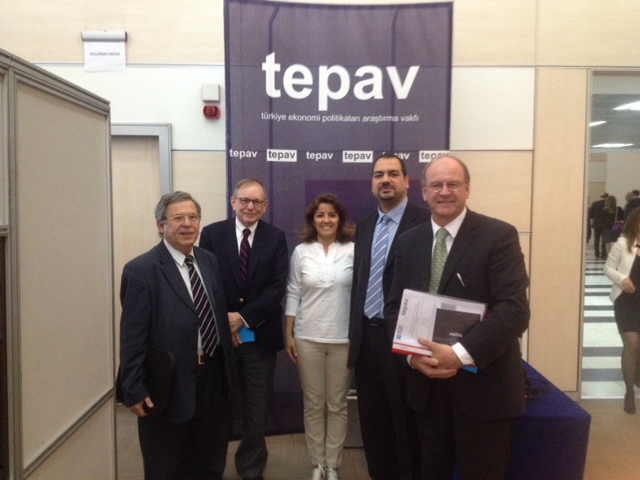 BRITISH COUNCIL & TEPAV* FORUM
BRITISH COUNCIL & TEPAV* FORUMNATIONAL NEEDS ASSESSMENT OF ENGLISH LANGUAGE TEACHING IN TURKISH STATE SCHOOLS
7 May, 2014
Nurdan Çoksezen Metel
*The Economic Policy Research Foundation of Turkey
The forum was held in May 2014, at TOBB University, in Ankara and was attended by approximately 30 participants. Tufan Buzpınar, a board member of the Higher Education Council, Güven Sak, Director of TEPAV, Yusuf Tekin, a consultant to the Turkish Ministry of Education, and Chloe Ewing, the Assistant Director of British Council Turkey gave the opening speeches. These were followed by presentations of the results of the study into English language teaching at state schools from Efşan Nas Özen, the lead researcher at TEPAV and consultant David Vale from the British Council. The forum ended with a debate among METU Faculty of Education Dean Gölge Seferoğlu, TOBB Department of Foreign Languages director Taner Yapar and INGED director Aydan Ersöz.
The British Council and TEPAV collaborated to conduct a large scale survey across Turkey between February and July 2013. The survey aimed to collect detailed data on needs across Turkish state schools at Primary, Middle, High and Vocational school levels. The main aim of the research was to provide the Turkish Ministry of Education with reliable and comprehensive data on which to base reforms to curriculum and classroom practice with respect to English language teaching and learning. The research included field surveys completed by approximately 21.000 students, parents and English teachers. It also included 80 classroom observations focusing on the teachers’ professional needs.
 I would like to share some of the findings from the forum which caught my attention:
I would like to share some of the findings from the forum which caught my attention:-The problem in Turkish education lies not only in foreign language teaching but also in teaching the mother tongue.
- Despite the big investments made, foreign language teaching in the Turkish education system is still a failure.
- English language teaching should be evaluated with an approach which takes into account all stakeholders as well as the impact of current educational practices on the success of students in their university studies and professional lives and also on the welfare of the country.
- There is no test of the skills and knowledge of new graduates from education faculties but there must be. A section to test a candidate’s knowledge of their field has only recently been added to the KPSS exam. Previously, there was no such section.
- The Ministry of education must apply consistent policies with regard to professional development training for teachers.
- The level of proficiency in English of students starting their university education decreased significantly after the abolition of preparatory English classes in Middle Schools when the length of High School education was extended to 4 years.
Some Conclusions Underlined by the Researchers Regarding the Needs Assessment Survey
- The level of English proficiency of students at state schools is still at basic level after 1000 hours of instruction.
- Technological facilities are not sufficient and/or not beneficial in foreign language classrooms.
- Teachers are not provided with necessary professional development training opportunities.
- Students’ interest levels towards foreign language learning and their awareness about their level of English is decreasing over time.
For more details about National Needs Assessment of English Language Teaching in Turkish State Schools, visit our Teacher’s bookshelves in the admin office where you can find four copies of the report that I brought to our school.
